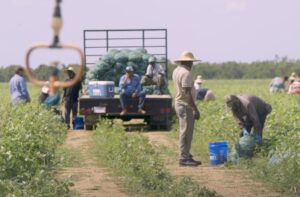WSLR’s Surreal News interviews a farmworker advocate.
Johannes Werner
Original Air Date: Jan. 17, 2025
Host: A bill that would protect farmworkers and construction workers from heat died in committee last year. But it may be coming back in this legislative session that begins March 4. Lew Lorrini, host of the Surreal News show on WSLR, interviewed Ernesto Ruiz, executive director of the Farmworker Association of Florida, a non-profit headquartered in Apopka, with offices in Homestead and Immokalee.
Johannes Werner: The bill that would protect the health and lives of farmworkers—practically all of them immigrants, many of them undocumented—ended up being ignored by the Republican supermajority in the last legislative sessions. That contrasts with a bill that protects student athletes. Ernesto Ruiz:

Ernesto Ruiz
Ernesto Ruiz: We’ve been trying to get a state-level heat standard passed for years, and we’ve been able to get sponsors at the legislative level here in the state of Florida, but the proposed legislation that we supported died in committee—never even brought up for a vote. What we’re calling for is very similar to what OSHA proposed last year in their federal suggested guidelines, and it’s common sense. This isn’t rocket science. We need to ensure that workers have safety from heat stress. That’s pretty easy to achieve. You need to monitor the temperature; you need to monitor their exertion; they need to have access to water; they need to have access to areas in which they can cool down, particularly during critical periods of the year, which in Florida is June—May, sometimes—through October. And it’s stuff that we already do for student athletes. The Zachary Martin Act passed in the state of Florida unanimously after two tragic deaths of student athletes, which tells us that the legislature—the same governor—they understand the science behind it. It’s not a complicated issue. What seems to be complicated for some people is to extend the same sort of consideration to certain groups of people over others—in this case, our farmworkers, our construction workers, the people who dig our ditches for our high-speed fiber optic cables, so on and so forth. For whatever reason, our state government doesn’t seem to prioritize them or value them as they do other groups of people. Again, it’s common sense.
JW: Proponents of mass deportations argue that Florida’s agriculture will not be affected seriously. They believe that undocumented workers will be replaced by temporary workers brought to the United States under a visa category called H2A. Ernesto Ruiz, with the Farmworker Association, is skeptical.

Florida farmworkers. Still shot from the documentary ‘Facing the Sun’.
ER: This is not good for the farmowners. This is not good for the industry. To what extent is this all just some sort of dogwhistle to rally up the base, to get them out to vote? I don’t fathom myself clever enough to try to guess what Donald Trump will do. We shall see. But there’s good reason to be worried. I’ll have to look at my numbers. It is true that we’ve been increasingly using H2A workers, and I believe Florida is the state that uses the highest proportion of H2A workers. There is no doubt that there has been an upward trend for the last 12 years or so with trying to replace H2A workers. This idea, though, that that somehow will not affect Florida is—in a sense, I think it shows you the ethical framing—how these people are viewed. These H2A workers are here sometimes for 10 months at a time. Are we saying that they’re not part of Florida? Are they not our community members? They’re working here. They’re paying taxes. They’re spending money here. They’re community members. They’re feeding us. To casually say, “Oh, well, it’s not going to affect Florida,” well, that’s pretty myopic, and it also shows you how some people—a lot of them, unfortunately—view workers as just a cog in a machine. Moreover, that program is rife with exploitation. Human trafficking, wage theft.
JW: To listen to Lew Lorrini’s full interview with Ernesto Ruiz of the Farmworker Association of Florida, go to https://archive.wslr.org/ and search for the most recent edition of Surreal News.
WSLR News aims to keep the local community informed with our 1/2 hour local news show, quarterly newspaper and social media feeds. The local news broadcast airs on Wednesdays and Fridays at 6pm.